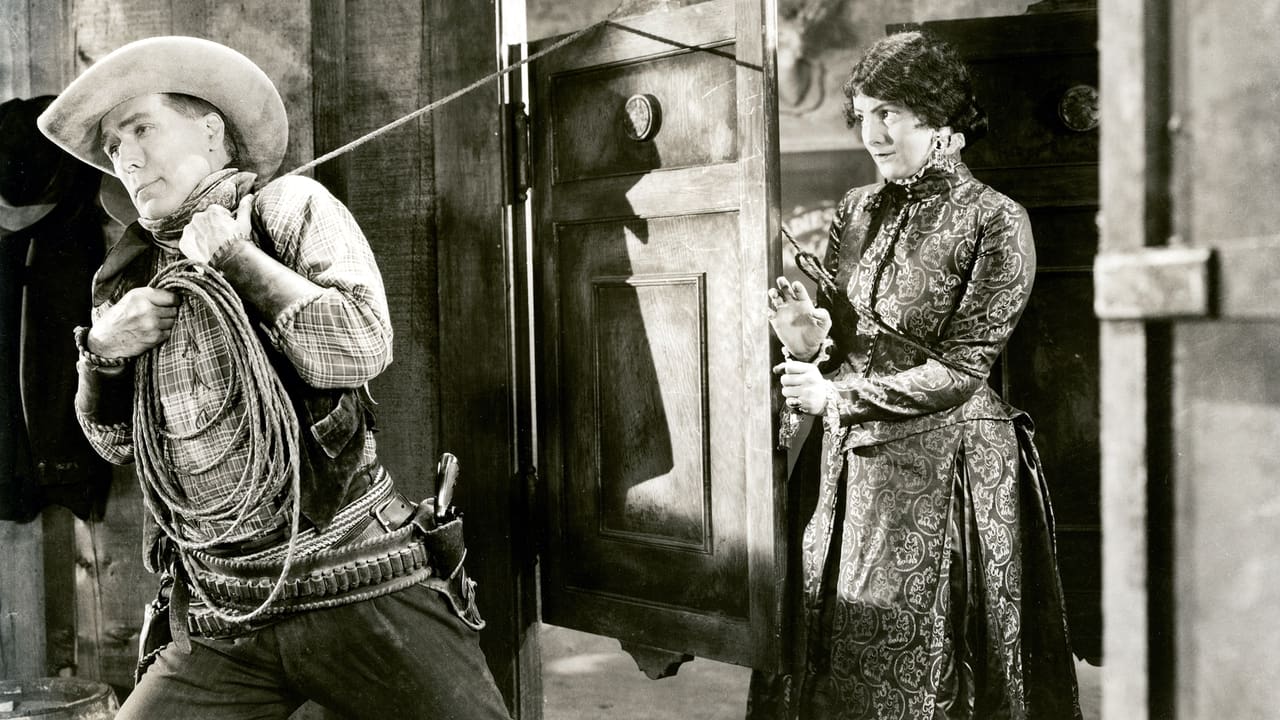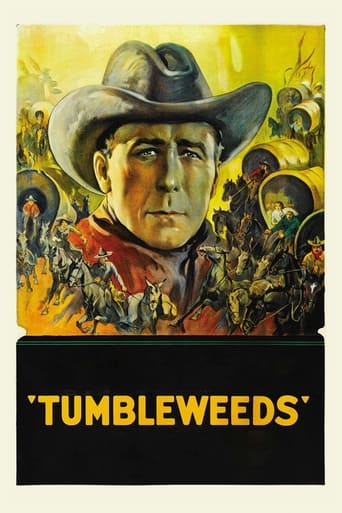



Let's be realistic.
A Disappointing Continuation
a film so unique, intoxicating and bizarre that it not only demands another viewing, but is also forgivable as a satirical comedy where the jokes eventually take the back seat.
View MoreOne of the best movies of the year! Incredible from the beginning to the end.
View MoreJust from reading about him, I became a fan of William S. Hart before I ever saw one of his movies.When I moved to Los Angeles, I made a pilgrimage to the late lamented Silent Movie Theatre on Fairfax, not only to see whatever silent films there might be available, but to plead for a chance to see any Hart film, and especially "Tumbleweeds," about which I had read so much.Alas, the Hamptons, owners of the Theatre, never did show it, but I was able to rent a 16 mm print and show it myself, in my tiny living room.It was all I had hoped. It was, and is, magnificent.Character development was nigh onto perfect, and the intertitles by C. Gardner Sullivan, surely one of the greatest of such writers, merely enhanced the beauty of the presentation.Oh, but there is more: Camera angles were brilliantly formatted. Only later did I learn that Mr. Hart himself was co-director.William S. Hart (http://www.imdb.com/name/nm0366586/?ref_=fn_al_nm_1) was born a city slicker but, like me, I guess, he fell in love with the West and its mystique. He wanted to share that love with everyone, and for too few years presented the mythology.You can find his spoken farewell at YouTube (https://www.youtube.com/watch?v=_BlgWP3Airs), and if you're really lucky you will find a copy of "Tumbleweeds" with that farewell used as a prologue. It still moves me to tears.One reason I cry is that, listening to him, I think how great a talkie actor he could have been, with that voice; and I think what a loss to those of us who love Westerns generally and who love William S. Hart in particular."Tumbleweeds" is a classic, regardless of genre. It is poetry on film, a magnificent motion picture.
View MoreWilliam S. Hart plays a tough and laconic cowboy--the sort of guy who loves the life and has no desire to settle down and get a place of his own. However, he meets a pretty lady (Barbara Bedford) and immediately decides that marrying and settling down is a GREAT idea. So, as the Oklahoma land run is about to commence, he decides to take part in this insane opportunity to get a homestead.Let me digress a bit to explain. In 1889, a law was signed that opened up 2,000,000 acres of land in Oklahoma to settlers. However, instead of signing up for it to stake your claim, they literally staged a race--where folks rode like crazy into the open land and grabbed a marker. Then, upon returning it to the government agent, they'd be given that particular parcel. And so, if you wanted the best land (such as along a river), you had to be fast--or cheat (these folks was given the nickname 'Sooner' because they went in BEFORE they were officially allowed).What Hart does not know is that the lady's half-brother is trying to cheat in order to get the best land AND he sets up Hart to make it look like he's trying to be a Sooner instead! Can William manage to expose this jerk AND still win the sister's love? Like so many of Hart's films I have seen, Hart is a rather quiet fellow who lets his fists do the talking. He is NOT some pretty boy and he seems to look more like you'd expect a real cowboy to look. While this is not among his very best films, it's well made and talks about one of the most forgotten parts of US history--the land runs. Worth seeing.By the way, the copy I had was silent but had musical accompaniment that was added later.
View MoreIn the 1939 re-release's introduction, William S. Hart explains, "The story of 'Tumbleweeds' marks one of the greatest epochs of our American history. It tells of the opening of the Cherokee Strip in the year 1889. Twelve hundred square miles of Cherokee Indian lands, on one front, over two hundred miles long, were thrown open by our government to those seeking good earth upon which they might make their homes."Mr. Hart (as Don Carver) and comic sidekick Lucien Littlefield (as Kentucky Rose) are two of the cattle ranchers who are put out when as the Oklahoman Cherokee Strip is "thrown open" by the government. For Hart, the silver lining comes in the form of a several decades younger sweetheart, homesteader Barbara Bedford (as Molly Lassiter); however, her nasty half-brother J. Gordon Russell (as Noll Lassiter) threatens to spoil the fun. Little brother Jack Murphy (as Bart Lassiter) and his pup have the highest profile relationship that actually works. Still, the film has Hart, and its exciting "land rush!" sequence.The re-release (which, apart from Hart's cool Shakespearian appearance, is the inferior version, by the way) features the legendary star's farewell: "My friends, I loved the art of making motion pictures. It is as the breath of life to me no longer a cloud of dust, but a beautiful golden haze through which appears a long phantom herd of trailing cattle. At their head, a Pinto pony with an empty saddle the boys up ahead are calling -- they're waiting for you and me to help drive this last great round-up into eternity "Adios, amigos. God bless you all, each and every one." ******* Tumbleweeds (12/20/25) King Baggot ~ William S. Hart, Lucien Littlefield, Barbara Bedford
View MoreI can see how one would be sentimental over William S. Hart's last Western, especially considering Hart was such a sentimentalist himself. But, his prime was years ago, with such films as "Hell's Hinges" (1916), "The Narrow Trail" (1917) and "Wagon Tracks" (1919). "Tumbleweeds" is far removed from those Hart vehicles. Hart had done away with his patented good bad-man persona; here, he's a gentler and fatter, goofy but good-natured, old cowboy. Hart also gets a dimwitted comedic sidekick, unfortunately. The filmmakers, first, attempt some romantic imagery, which generally fails, and, then, aim too much for humor, with lots of buffoonery. This new style probably reflects Hart's attempts to emulate the new B-Western shoot-em-ups, which had been surpassing his more adult Westerns in popularity by attracting a large audience of young boys.The villains suddenly impose a more dramatic tone to the second half of the film, and lead it to its inevitable conclusion. The fatality of the open frontier in the story mirrors that of Hart's career, but rather than the evident passion and romanticism one gets in his earlier pictures, we get song title cards. Additionally, Hart is competing for a civilized woman here, rather than for his Christian soul. At least, it's nice to see a more friendly, if brief, treatment of Native-Americans in this Hart outing. And, Hart does have one more exciting, well-edited horserace climax in him, but it was definitely time to hang up the saddle.
View More